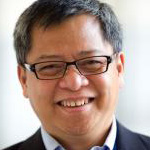
The premature announcement by Ateneo de Davao president Joel Tabora, SJ, that former UST professor Jose David Lapuz would be appointed the new head of the Commission of Higher Education (vice Dr Patricia Licuanan, Tabora’s bête noire), has been mostly met with derision and laughter.
These mainly came from Lapuz’s former students, who pleaded with netizens and everyone else to prevent Lapuz from replacing Licuanan. The hilarity and apprehension worsened when curious minds found Lapuz's excruciatingly grammar-deprived, fawning letter to Rodrigo Duterte reminding the president-elect of his promise to appoint his former teacher as CHED jefe.
Why Tabora hates Licuanan is something that seems to go beyond the issue of allegedly unaccounted CHED funds. It will be of interest to our investigative journalists to delve into this un-Jesuit-like abhorrence of a fellow Catholic.
However, it is odder to watch Tabora, a cleric, seemingly gleeful over Lapuz's possible appointment, given that the latter’s early claim to fame was his defense of the Noli-Fili Law from sectarian attacks led by, of course, the Jesuits!
The late Senator Francisco “Soc” Rodrigo, who was one of the stalwarts the Catholic offensive to prevent young Filipinos from learning about Rizal, must be turning in his grave now as he watches a representative of his conservative cabal break bread with the loudest defender of Lolo Jose becoming law.
It was these early years of Lapuz as a defender of secularism and the Enlightenment that have disappeared in the current merriment/panic over his ambition to be CHED head.
Here are some stories I heard or experienced myself about Lapuz when I was at the State University.

There is no doubt that Lapuz is an original, especially when it comes to showy hours-long oratories, where all political issues, ideological contestations, and philosophical differences end up with him and his heroic resolution of these matters. But save for his excessive narcissism and lousy British accent (whose origins people continue to argue over until today), he is also not actually unique.
This self-assured and dare I say quite relatively smart demeanor was a characteristic of his and his cohorts at UP when they were still students.
Lapuz’s classmates and barkada included the poet Jose Maria Sison, the law student Enrique Voltaire Garcia, the essayists Petronilo Bn. Daroy, Temario Rivera, Luis Teodoro, and Ninotchka Rosca, the brooding Asianists Nur Misuari, the comical but brilliant ex-Jesuit Hilario Lim, and the quiet activists Luzvimindo David and Nilo Tayag.
They took courses under a young Marxist political science instructor Dodong Nemenzo, UP sole “expert” on foreign relations the Congressman Manuel Cases, the rising nationalist historian and voice of the masa Teodoro Agoncillo, the philosophers Ricardo Pascual Roque Ma-Mon, and the English professor Leopoldo Yabes.
This group was on the frontline of UP’s defense of its academic freedom from sectarian attacks by Tabora’s senior colleagues (including the influential UP parish priest John Delaney, SJ) and the Committee on Un-Filipino Activities (CUFA), a poor Pinoy copycat of the infamous Committee on Anti-American Activities led by the Senator Joseph McCarthy. We had as McCarthy’s equivalent the dull Leonardo Perez (who later became Marcos’ sinister Comelec commissioner).
They responded to nasty clerical asides with élan. Journals, like the Diliman Review and the Philippine Social Science and Humanities Review, were filled with essays zealously defending UP’s liberalism, anti-sectarianism, and autonomy. A former student of Ricardo Pascual recalled how the philosophy professor shocked him and his classmates by spitting on the image of Jesus Christ just to show that God was nothing but a figment of their fears and imagination. Many became atheists and agnostics after taking his class.
The faculty and students of this era argle-bargled over philosophies and ideologies, especially Marxism and nationalism. One of their mentors, Professor Silvino Epistola, introduced nationalism in Asia to his students by telling them to just look out the window. Students like Lapuz involved themselves in a propaganda campaign to get Congress to pass the Noli-Fili bill. Others formed nationalist and radical circles like Ang Bagong Asya, the Kabataang Makabayan (KM), and the Bertrand Russel Peace Foundation.
They joined the Movement for the Advancement of Nationalism (MAN), the coalition of nationalist politicians, business leaders, union leaders, and students and legal personalities of the reviving Partido Komunista ng Pilipinas (PKP). Lapuz ran as a candidate for MAN’s executive council but lost to the young Zamboangueño Eduardo Tadem. A significant factor behind that loss was Lapuz’s excessive, British-toned oratories. Those who elected the board of directors marveled at and guffawed over Lapuz’s bombast; they immediately deemed he was not fit for a leadership role.
This was, therefore, a generation that was very sure of itself, and believed that they were History’s vanguard, anointed to be the heirs of the 1896 revolution but also promising that they would not repeat the mistakes of Bonifacio et al. This was the source of their arrogance: they thought they were the ones to complete the quest for full nationhood.
They expressed these sentiments and opinions in the essays they wrote (academic and polemical), the speeches they made (from classrooms to Plaza Miranda), and the manner in which they recruited (like Leninists they recruited the best and brightest inside UP; the not-so-bright became the apparatchiks).
A majority of the students would eventually constitute the first central committee of Sison’s “re-establish” a new communist party.
The loudest among them was Jose David Lapuz. But he was not alone in showing off this hilarious talent. In fact, some of the above-cited characters had similar quirks as the ex-UST professor; they were also often much livelier, funnier, definitely self-absorbed but more grounded because they spoke sans any accent than that of their own.
(Next: The writer talks about other personalities from his time as a student who gave Jose David Lapuz a run for his money.) – Rappler.com
Patricio N. Abinales is an OFW.